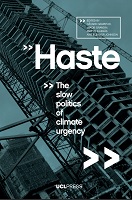Haste
The slow politics of climate urgency
Contributor(s)
Haarstad, Håvard (editor)
Grandin, Jakob (editor)
Kjærås, Kristin (editor)
Johnson, Eleanor (editor)
Language
EnglishAbstract
What does it mean politically to construct climate change as a matter of urgency? We are certainly running out of time to stop climate change. But perhaps this particular understanding of urgency could be at the heart of the problem. When in haste, we make more mistakes, we overlook things, we get tunnel vision. Here we make the case for a ‘slow politics of urgency’. Rather than rushing and speeding up, the sustainable future is arguably better served by us challenging the dominant framings through which we understand time and change in society. Transformation to meet the climate challenge requires multiple temporalities of change, speeding up certain types of change processes but also slowing things down.
While recognizing the need for certain types of urgency in climate politics, Haste directs attention to the different and alternative temporalities at play in climate and sustainability politics. It addresses several key issues on climate urgency: How do we accommodate concerns that are undermined by the politics of urgency, such as participation and justice? How do we act upon the urgency of the climate challenge without reproducing the problems that speeding up of social processes has brought? What do the slow politics of urgency look like in practice? Divided into 23 short and accessible chapters, written by both established and emerging scholars from different disciplines, Haste tackles a major problem in contemporary climate change research and offers creative perspectives on pathways out of the climate emergency.
Keywords
climate change;speed;sustainability;politics;environment;technology studies;Cities;Green transformation;Urgency;time;slowness;temporality;JusticeDOI
10.14324/111.9781800083288ISBN
9781800083301, 9781800083295, 9781800083318, 9781800083288Publisher
UCL PressPublisher website
https://www.uclpress.co.uk/Publication date and place
London, 2023Classification
Climate change
Urban communities
Earth Sciences, Geography, Environment, Planning


 Download
Download Web Shop
Web Shop